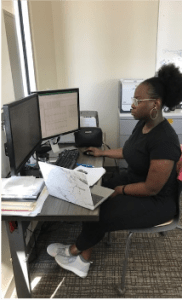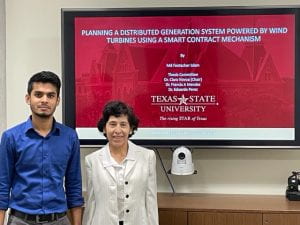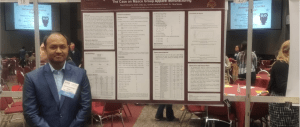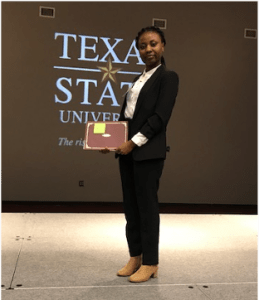Systems Optimization Learning and Renewable Energy (SOLAR) Lab
Location: IGRM 4207B
Scope:
The Systems Optimization Learning and Renewable Energy Research (SOLAR) lab supports undergraduate and graduate research in:
- Data Analytics/Data Science (i.e. data mining and statistical analysis)
- Prescriptive Analytics (i.e., Operations Research) methodologies:
- Stochastic programming,
- Dynamic programming,
- Non-linear programming,
- Linear programming,
- Integer prgramming,
- Heuristics and meta-heuristics optimization,
- Machine learning algorithms (e.g. prediction, classification, feature selection and reinforced learning algorithms)
- Parallel computing to accelerate the performance of algorithms to solve NP-hard problems in operations research using multiple CPU’s and/or GPU’s
Problem Domains:
- Renewable Energy Systems Planning (wind energy, solar energy, energy storage systems, smart contracts)
- Logistics (e.g., vehicle routing, facility location, facility layout, humanitarian logistics)
- Supply Chain Optimization (e.g., agile, sustainable and socially responsible supply chain design),
- Cybersecurity of cyber physical systems,
- Service systems optimization (healthcare, food banks, recycling industries).
In solving large-scale logistics, industrial and sustainability problems, it is common to merge Data Analytics, Prescriptive Analytics and High-Performance Computing in CPUs and GPUs.
Students Activities:
Students working in the lab under Dr. Novoa’s supervision present research in national and international conferences such as:
- Institute for the Operations Research and Management Science (INFORMS),
- Institute of Industrial and Systems Engineers (IISE),
- Decision Sciences Institute (DSI),
- IEEE International Conference on Industrial Informatics (INDIN)
- IEEE Conference on Communications and Network Security (CNS),
- Super Computing (SC 18)
- The International Conference for High Performance Computing, Networking, Storage, and Analysis, Practice & Experience in Advanced Research Computing (PEARC),
- Extreme Science and Engineering Discovery Environment (XSEDE), and
- Society of Women Engineers (SWE) Local
Students also present research work at Texas State University internal conferences such as:
- International Graduate Research Conference – Texas State University
- Honors College Undergraduate Research Conference (URC) – Texas State University
- Women in Science and Engineering (WiSE) – Texas State University
Students Honors and Awards:
- “Planning Distributed Generation Systems Powered with Wind Turbines using a Stochastic Programming Model,” Fantacher Islam, Clara Novoa, Francis Mendez Mediavilla. Finalist: Best Student Paper Competition Presentations. Special Session, Energy Systems Division, Institute of Industrial and Systems Engineers (IISE) Annual Conference & Expo, May 22, 2023, New Orleans, LA. https://iise.confex.com/iise/2023/meetingapp.cgi/Paper/1860
- “Aggregate Production Planning with Renewable Energy,” Sayed Rezwanul Islam, Clara Novoa, Tongdan Jin. First Place Annual Minority Issues Forum (MIF) Student Poster Competition, INFORMS Annual Conference, October 24, 2021, Anaheim, CA https://connect.informs.org/minorityissuesforum/awards/postercomp/pastposter
- “A Multi-stage Stochastic Model for Production Planning with Renewable Energy Generation,” Atamgbo Ayuwu, Clara Novoa, Tongdan Jin. People’s Choice Poster Award Winner, Women in Science and Engineering (WiSE) Conference, Texas State University, March 6, 2020, San Marcos, TX. https://wise.cose.txstate.edu/WiSE-Events/WiSE-Conference-Archive/archive-2020conference.html
- “Stochastic Models for Planning Distributed Wind Generation based on Data Analytics” Temitope Runsewe, Clara Novoa, Tongdan Jin. Third place winner lighting talk and poster presentation at the 2019 Society of Women Engineers (SWE) Local Conference Collegiate Competition, February 9, 2019, Baltimore, MD. (Link not available on the Web anymore unfortunately)
- “Facility Layout at McNeil Warehouse Goodwill Industries” Clara Novoa and undergraduate student Nhi Mai won the Honorable Mention (2nd place) in the Decision Sciences Institute Annual Meeting Best Application Paper Award competition in Fall 2012. (Link not available on the web anymore). Complete paper citation: Novoa, C. M., & Mai, N. (2012). Facility Layout at McNeil Warehouse Goodwill Industries. In Decision Sciences Institute 43rd Annual Meeting (pp. 37501–37514).
Hardware:
Computers and Printers:
- 2 Dell Precision Tower 3420 desktops (3.60 GHZ Intel Core i7-7700 processor, 16 GB RAM, 500 GB Hard Drive) with two 30″ wide screen monitors and running Windows 10 (64 bit)
- 1 Brother Color Laserjet Printer HL-3170CDW
Software:
General use:
- 2 Microsoft Office Enterprise (Includes Microsoft Visio and Microsoft Project)
Data analytics/data science :
- 2 Anaconda Platform
- 2 Minitab
- 2 Stata
Prescriptive Analytics (i.e., Operations Research/Optimization):
-
- 2 Gurobi Py running in the Anaconda Platform through Spyder, JupyterLab, or Jupyter Network
- 2 AMPL API for Python (AMPLPY) running in the Anaconda Platform through Spyder, JupyterLab, or Jupyter Network
- AMPL uses the CPLEX, Gurobi and Xpresss solvers for linear programming, and Knitro and Baron solvers for non-linear programming
- 1 Knitro from Artelys Python API running in the Anaconda Platform through Spyder
- 1 Analytic Solver Platform
- 2 GAMS
- 2 FICO Xpress
- 2 Mathematica
- 2 Matlab
- 2 Mathcad Prime
- 2 TORA
- 2 Arena Simulation
Lean Manufacturing or Methods Engineering :
- Time study software:
- 2 ProTimeEstimation
Tools for connecting to clusters and remote servers:
-
- 2 Putty
- 2 Filezilla
Clusters and Servers Accessible by Remote Connection:
-
-
- LEAP – High Performance Computing Cluster – Texas state University
It is a cluster managed by the Division of Information Technology (DOIT). The complete capabilities of the cluster are available at https://doit.txstate.edu/rc/leap.html - Texas Advanced Computing Center (TACC) University of Texas at Austin – Pickle Research Center
More information at https://portal.tacc.utexas.edu/
- LEAP – High Performance Computing Cluster – Texas state University
-
Faculty:
-
-
- Clara Novoa, Professor at the Ingram School of Engineering Industrial Engineering Program. Dr. Novoa’s research covers the following methodologies and applications:
- Methodologies: data science, prescriptive analytics (i.e., operations research) techniques such as stochastic programming, dynamic programming, non-linear programming, linear programming, integer programming heuristics, simulation optimization, and machine learning algorithms. She also has researched on the use of high-performance computing for solving large-scale OR problems
- Applications: renewable energy planning (e.g., wind energy, solar energy, energy storage systems, electric vehicles, smart contracts), logistics (e.g., vehicle routing, facility location, facility layout, humanitarian logistics), optimization of manufacturing, service, and supply chain systems (e.g., designing green supply chains, optimizing acquisition and distribution of food managed by charitable organizations), and cybersecurity of cyber-physical systems.
- Clara Novoa, Professor at the Ingram School of Engineering Industrial Engineering Program. Dr. Novoa’s research covers the following methodologies and applications:
-
Students Involved:
- Industrial Engineering Graduate Students:
-
- Jakir Hassan (Spring 23 – Present)
- Md Fantacher Islam (Summer 22 – Summer 23)
- Sayed Rezwanul Islam (Spring 20 – Summer 21)
- Atamgbo Ayuwu (Summer 19 – Fall 20 )
- Divya Zala (Fall 18 – Fall 20)
- Temitope Runsewe (Spring 18 – Summer 19)
- Khan Siddique, Industrial Engineering (Spring 17 – Fall 17)
- Gowtham Balachandran, Industrial Engineering (Spring 16 – Spring 18)
-
- Computer Science Graduate Students:
-
- Chandra Kolla, Graduate Student Computer Science Department (Fall 14 – Fall 15)
- Abhilash Chaparala, Graduate Student Computer Science Department (Summer 13 – Summer 14)
- Sujeeth Pasham, Graduate Student Computer Science Department (Spring 12 – Spring 13)
-
- Engineering Technology Graduate Students:
-
- Fei Sun, Graduate Student Engineering Technology Department (Spring 13 – Spring 15)
- Hayden Beauchamp, Graduate Student Engineering Technology Department (Spring 12 – Spring 13)
-
- Industrial Engineering Undergraduate Students:
-
- Brandon McCarthy (Fall 21 – June 22)
- Jordan Givens (Fall 17 – Spring 18)
- Karina Yanes Portillo (Fall 14 – Spring 17)
- Chandler Franklin (Fall 14 – Spring 15)
- Cameron Paiga (Fall 13 – Spring 14)
- Nhi Mai (Fall 11 – Spring 13)
- Molly McDaniel (Fall 11 – Spring 12)
- Suleima Alkusari (Fall 10 – Spring 11)
-
- Computer Science Undergraduate Students:
-
- Abigail Barron (Spring 16 – Fall 17)
-
Publications:
To see publications from this lab please go to the publications tab and look for the names of the students listed above.



